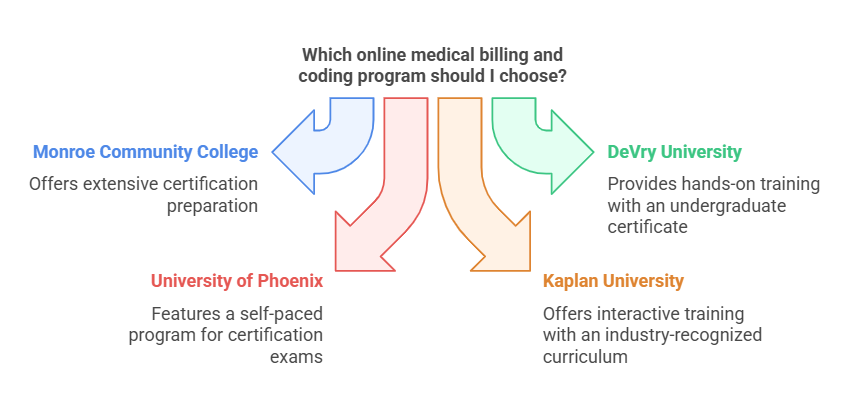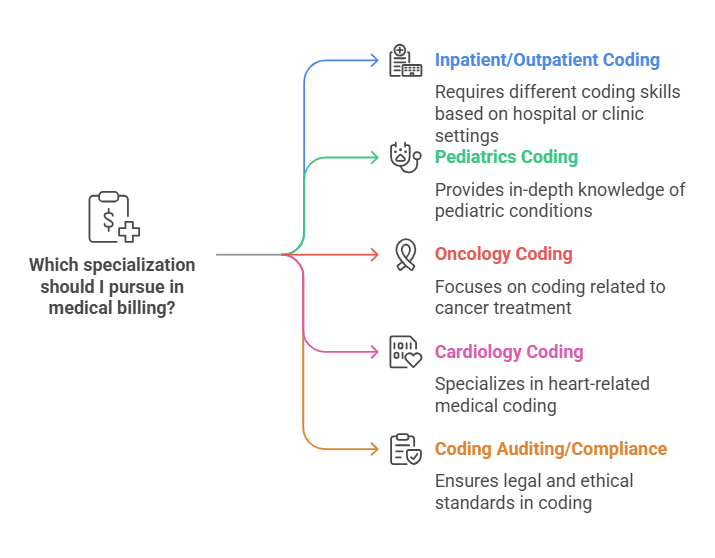Top Medical Coding Billing Classes for Your Career Advancement
Medical billing and coding is the process of assigning standardized codes to diagnoses and medical procedures to ensure accurate insurance reimbursement. Medical coders translate patient care details into CPT (Current Procedural Terminology) and ICD (International Classification of Diseases) codes. Medical billers then use these codes to create claims, ensuring that healthcare providers receive timely and correct payments from insurance companies.
This profession requires knowledge of medical terminology, anatomy, and healthcare regulations, and obtaining a medical billing and coding certification can greatly enhance your qualifications. Medical billing and coding specialists play a vital role in streamlining the financial side of healthcare, making their expertise essential in hospitals, clinics, and private practices. With certification from AMBCI, professionals are well-prepared to excel in this field, ensuring accuracy in billing and adherence to healthcare regulations.
Benefits of a Career in Medical Coding
A career in medical coding offers job security and growth in the ever-expanding healthcare industry. With a high demand for skilled professionals, medical coders have ample opportunities for career advancement.
Professionals in this field enjoy flexible work environments, including remote job options. They can work in hospitals, insurance companies, private clinics, or even establish their own medical billing businesses. Medical coders often earn competitive salaries with benefits such as health insurance and retirement plans.
Beyond financial stability, this career provides fulfillment by contributing to the efficiency of healthcare services. By ensuring accurate medical records and reimbursement, coders and billers help healthcare providers focus on patient care.
Types of Medical Billing Certifications
Certifications validate expertise in medical coding and billing, increasing employability and earning potential. The most recognized certifications include:
Certified Professional Coder (CPC) – Offered by the American Academy of Professional Coders (AAPC), this is one of the most sought-after certifications in the industry.
Certified Coding Associate (CCA) – Provided by the American Health Information Management Association (AHIMA), this entry-level certification is ideal for beginners.
Certified Coding Specialist (CCS) – Also from AHIMA, this certification is for experienced coders looking to specialize in hospital-based coding.
Certified Medical Billing (CMB) – Offered by the Medical Association of Billers (MAB), this certification focuses on the billing aspect of the profession.
Certified Medical Reimbursement Specialist (CMRS) – Also from MAB, this certification is for professionals seeking advanced billing expertise.
Earning these certifications enhances job prospects and allows professionals to specialize in specific areas of medical coding and billing.
Top Medical Billing and Coding Classes in 2025
Many institutions now offer online medical billing and coding programs, providing flexibility for working professionals. Some of the top programs include:
Monroe Community College – Offers an extensive online medical billing and coding program with certification preparation.
DeVry University – Provides an online undergraduate certificate in medical billing and coding with hands-on training.
University of Phoenix – Features a self-paced medical billing and coding program that prepares students for national certification exams.
Kaplan University – Offers interactive online training with industry-recognized curriculum and exam preparation.
Southern New Hampshire University – Provides an affordable and flexible coding program with career support services.
These programs cover essential topics such as medical terminology, anatomy, healthcare regulations, and coding principles.
Medical Coding Course Curriculum
A comprehensive medical coding course includes:
ICD-10-CM, ICD-10-PCS, and CPT Coding Systems – Essential for accurate patient diagnosis and procedural coding.
Medical Records Management – Training in handling, storing, and processing medical records securely.
Insurance Reimbursement Processes – Understanding claim submission, denials, and appeals.
Healthcare Compliance and Regulations – Covering HIPAA, Medicare, and Medicaid billing guidelines.
Certification Exam Preparation – Offering practice tests and study guides to help students pass their certification exams.
Many programs provide hands-on training with simulated coding and billing tasks, preparing students for real-world applications.
Medical Billing Specializations
Medical billing professionals can specialize in specific fields, increasing job opportunities and earning potential. Some specializations include:
Inpatient and Outpatient Coding – Requires different coding skills based on hospital or clinic settings.
Pediatrics, Oncology, and Cardiology Coding – Specializing in these areas provides in-depth knowledge of specific medical conditions.
Certified Pediatric Coder (CPC-P) – Focuses on pediatric billing and coding practices.
Medical Coding Auditing and Compliance – Ensures healthcare facilities comply with legal and ethical standards.
Advanced certifications and experience in specialized fields can lead to leadership roles and higher salaries.
Job Outlook and Career Paths in 2025
The demand for medical billing and coding professionals continues to grow. According to the U.S. Bureau of Labor Statistics, employment in this field is projected to increase by 7% from 2025 to 2030, driven by the expanding healthcare industry and the shift to electronic health records (EHRs).
Career paths include:
Medical Coder – Assigning standardized codes to medical diagnoses and procedures.
Medical Biller – Handling insurance claims and reimbursement processes.
Coding Auditor – Reviewing coded records for accuracy and compliance.
Medical Coding Instructor – Teaching aspiring medical coding professionals.
Independent Consultant – Providing coding and billing services for healthcare providers.
This career offers both stability and opportunities for professional growth.
Professional Associations and Resources
Medical coding professionals can benefit from joining professional organizations, which provide networking opportunities, career development resources, and certification preparation. Key associations include:
American Academy of Professional Coders (AAPC) – Offers certification exams, continuing education, and career support.
American Health Information Management Association (AHIMA) – Provides resources for medical coders and health information professionals.
Medical Association of Billers (MAB) – Focuses on billing certifications and training.
These organizations help professionals stay updated with industry trends, such as AI-driven coding software and evolving healthcare regulations.
Six Lesser-Known Facts About Medical Billing and Coding
Medical Coding is Not Just for Hospitals – Coders can work in law firms, insurance companies, and research institutions.
While specific sources detailing these exact settings are limited, the versatility of medical coders is acknowledged in the industry. Coders often find opportunities beyond hospitals, including roles in insurance companies and research institutions. For example, the article "Embracing Change: AI in Medical Coding" discusses the evolving roles of coders, including positions in auditing and clinical documentation improvement, which are relevant to law firms and insurance companies.
aapc.comAI is Revolutionizing the Field – Advanced AI-powered coding tools are now assisting coders, increasing accuracy and efficiency.
The integration of AI in medical coding is transforming the field by automating routine tasks and enhancing accuracy. The article "Artificial Intelligence (AI) and Medical Coding Part 2 – How Using AI Will Affect the Work of Medical Coders" discusses how AI and machine learning are impacting medical coders, leading to increased efficiency and productivity.
hiacode.comFreelance Medical Coders Exist – Many professionals work independently, offering remote coding services.
The medical coding profession offers opportunities for freelance work, with many professionals providing remote coding services. The article "AI in Medical Coding: Automation & Opportunities in 2024" highlights the growing demand for skilled medical coders and the various career paths available, including freelance and entrepreneurial ventures.
enfinitymedicalbilling.comBilingual Coders are in High Demand – Fluency in Spanish or Mandarin can open additional job opportunities.
While specific data on the demand for bilingual coders in Spanish or Mandarin is limited, language skills are generally valuable in the medical coding field. The article "How AI is transforming medical coding for physicians and coders" emphasizes the importance of specialized knowledge and adaptability in the evolving landscape of medical coding, suggesting that additional language skills could be beneficial.
healthcareitnews.comThe Industry is Going Fully Digital – Paper claims are rapidly disappearing, with most billing handled through electronic health record (EHR) systems.
The transition to digital systems in medical coding is well-documented, with a shift from paper claims to electronic billing through EHR systems. The article "Is AI Truly Disrupting the Medical Coding Job Profession?" discusses how AI-assisted medical coding is being developed, indicating a move towards digital solutions in the industry.
Healthcare GuysMedical Coders Can Work Internationally – U.S. certifications are recognized in countries like Canada, Australia, and the UAE.
U.S. medical coding certifications are recognized internationally, including in countries like Canada, Australia, and the UAE. The article "The Future of Medical Coding Jobs in the Era of AI" addresses the impact of AI on medical coding jobs, suggesting that specialized knowledge and certifications can open international opportunities.
medicodio.com
Frequently Asked Questions (FAQs)
-
Most programs take 6-12 months, depending on whether they are full-time or part-time.
-
Yes, many companies now offer remote medical coding jobs, especially for certified professionals.
-
No, but having a background in medical terminology or healthcare can be beneficial.
-
The median salary for certified medical coders is around $58,000 per year, with senior coders earning over $75,000
-
While not mandatory, obtaining a CPC, CCA, or CCS certification greatly improves job prospects.
Conclusion: Why Choose a Career in Medical Billing and Coding?
Medical billing and coding is a stable, well-paying career with growing demand. With flexible online training programs, industry-recognized certifications, and numerous specialization options, this field offers long-term job security and advancement opportunities. By staying updated with new technologies and healthcare regulations, professionals can enjoy a rewarding and fulfilling career in the ever-evolving healthcare industry.




